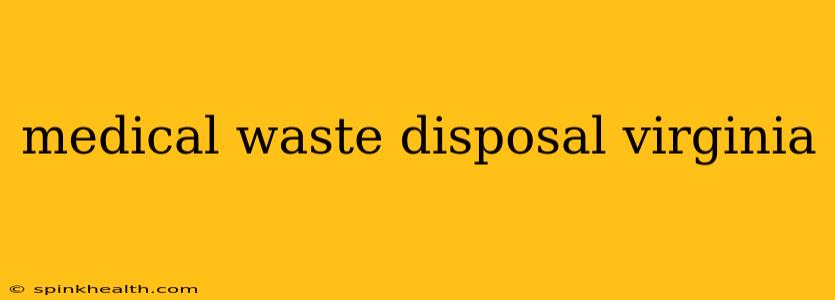Virginia, like all states, faces the critical challenge of safely and effectively managing medical waste. This isn't just about throwing away used bandages; it's about protecting public health and the environment from potentially hazardous materials. This guide delves into the complexities of medical waste disposal in the Commonwealth, addressing common questions and concerns.
My name is Alex, and I've spent the last decade working in environmental compliance and waste management. I've seen firsthand the crucial role proper medical waste disposal plays in safeguarding our communities. Let's explore this vital topic together.
What is considered medical waste in Virginia?
This is a crucial first step. Understanding what constitutes medical waste is paramount to ensuring compliance. In Virginia, medical waste encompasses a broad range of items, including but not limited to:
- Red Bag Waste: This is your typical "sharps" category – needles, syringes, lancets, and other items capable of causing punctures or cuts. These are often placed in designated red bags to clearly identify the hazardous nature of the contents.
- Pathological Waste: This includes human tissues, organs, and body parts removed during surgical procedures or autopsies. The handling and disposal of this waste are strictly regulated.
- Chemotherapy Waste: The potent chemicals used in cancer treatment require specialized disposal methods due to their toxicity and potential environmental impact.
- Pharmaceutical Waste: Expired or unwanted medications also fall under this category. Improper disposal can lead to water contamination and harm to wildlife.
- Other Regulated Medical Waste: This broad category can include items like cultures and stocks of infectious agents, blood and blood products, and items contaminated with blood or body fluids.
How is medical waste disposed of in Virginia?
The disposal process in Virginia is rigorously regulated by the Virginia Department of Health (VDH). Generally, it involves several key steps:
- Segregation and Packaging: Medical waste is meticulously segregated at the point of generation, often using color-coded containers and bags. Proper packaging ensures containment and prevents leakage or spillage.
- Transportation: Licensed medical waste haulers transport the waste to approved treatment facilities. These haulers must adhere to strict safety protocols to prevent accidental releases or exposure.
- Treatment and Disposal: Treatment methods vary, including incineration, autoclaving (steam sterilization), and chemical disinfection. The chosen method depends on the type and quantity of waste. Ultimately, the treated waste is often disposed of in landfills permitted to receive such materials.
Who is responsible for medical waste disposal in Virginia?
Responsibility for medical waste disposal lies primarily with the generator of the waste. This is typically the healthcare facility, doctor's office, veterinary clinic, or other entity producing the waste. They are responsible for:
- Proper Segregation and Packaging: Ensuring waste is correctly sorted and packaged according to regulations.
- Selecting a Licensed Hauler: Choosing a properly licensed and insured medical waste transporter.
- Maintaining Accurate Records: Keeping detailed records of waste generation, transportation, and disposal.
- Compliance with Regulations: Adhering to all relevant VDH regulations and guidelines.
What are the penalties for improper medical waste disposal in Virginia?
Improper medical waste disposal carries significant penalties. These can include:
- Fines: Substantial financial penalties can be levied for violations.
- Legal Action: In severe cases, legal action may be taken against violators.
- License Revocation: Healthcare facilities may face license suspension or revocation for repeated or egregious violations.
What are the regulations for medical waste disposal in Virginia?
The specific regulations for medical waste disposal in Virginia are detailed and complex, best found on the VDH website. However, key aspects include proper labeling, transportation protocols, treatment methods, record-keeping, and emergency response plans. Consult the VDH directly for the most up-to-date information.
How can I find a licensed medical waste disposal company in Virginia?
The VDH website is the best resource to identify licensed medical waste haulers in your area. You can often search by location to find companies servicing your specific region.
This guide provides a general overview. Always consult the Virginia Department of Health for the most accurate and comprehensive information regarding medical waste disposal regulations and best practices in the Commonwealth. Remember, responsible medical waste disposal is critical for protecting public health and the environment.

